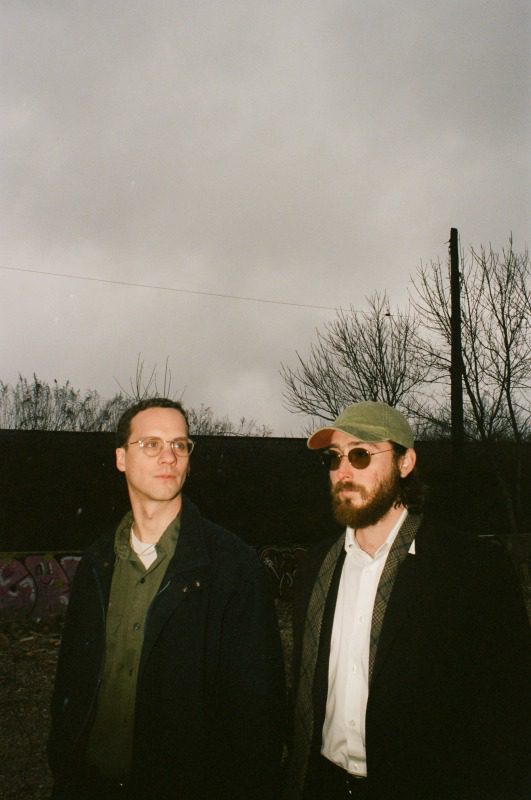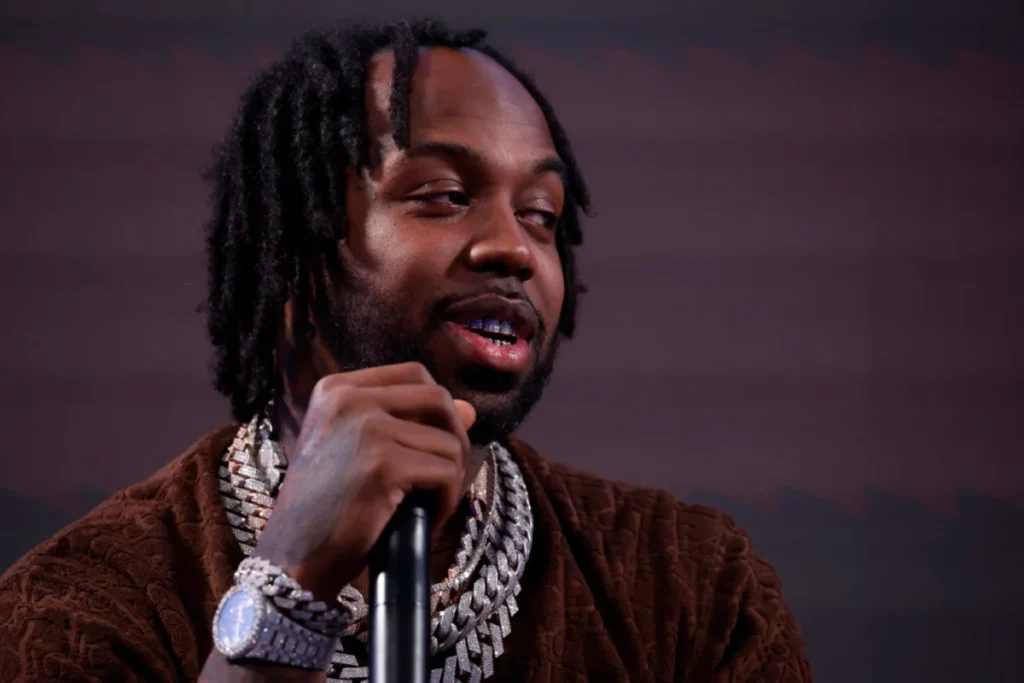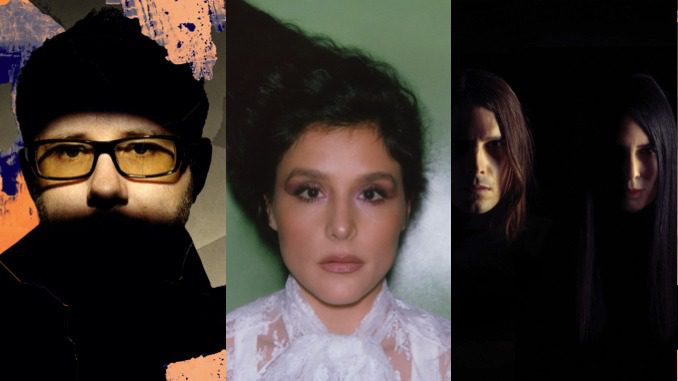The clocks have spun backwards and we’re fully in the mouth of autumn. There is music spilling into the streets—pastoral songs about love and seasons and people, baked in harvest light and sung between this life and the next. The local ballplayers have gold on their fingers; Halloween decorations are still hanging up. My car rummages through the avenues of Hollywood and the tape deck begs me to “fall back in love with Central Time.” Around this time six years ago I fled my college’s campus to hug the barricade at Mr. Smalls and hear Whitney play Forever Turned Around. It was the last concert I showed up early for on purpose, and it was there, near the Girtys Run banks of the grayed Allegheny River, that Julien Ehrlich and Max Kakacek led their bandmates into a pocket of eclipsing soft-rock and harmonious blowouts.
I still dream about that night—the slanted roads and graveyards encroaching upon sidewalks; the kitschy, lovelorn poetry of gooey falsettos and cursive trumpet blares; the perfectly replayable album gifted to a room full of strangers who are old news to me now. Three years later I heard SPARK for the first time and didn’t like it, aside from the palm-muted “MEMORY” and the groovy, sweeping “BLUE.” It sounded like my favorite band was having an identity crisis, in a Bon Iver-meets-Hot Chip pastiche of woodsy synth-pop. Whitney focused more on drum programming and sampling than expanding their sweeping, splendid history of guitar arpeggios and horn dressings. After combatting the sophomore slump by playing it safe and reinforcing their debut‘s sound on Forever Turned Around, a frustrated, overworked Whitney left behind their Band-like strains of FM rock music for an affectionate, if not dulled helping of Dilla and Eno.
But respect to Ehrlich and Kakacek for taking that electronic swing. It missing doesn’t erase the motive behind the attempt: the duo, burnt out from the feel-good, twangy backdrop of rock-n-soul that was pigeonholing them, needed a break from their longtime instruments. “I’ve been playing guitar since I was in seventh grade, and Julien’s been playing drums since he was two, three years old,” Kakacek says. “And we’re adept, in certain ways, on those instruments, but I think we’re falling victim to old habits deeply ingrained within our ideas of those instruments.” SPARK wasn’t just an open door, but a necessary, oft-frustrating step that divided critics, leading Pitchfork to wonder if Whitney’s “music is starting to sound better than it is.”
When Ehrlich and Kakacek wrote “Dave’s Song” ten years ago, they didn’t know exactly what Whitney was going to be. A country band, maybe. But Light Upon the Lake had a freedom to it that I can hear again in Small Talk, because Ehrlich and Kakacek miked up a drum kit and chased down a room tone. They savored making a record together in the same room again, flaws and all. “It feels good to have these weird mistakes on a live take of an acoustic guitar performance,” Kakacek admits. “It helped us refine those instruments in a way that didn’t feel like we were just remaking our old ideas. We’re doing something new with them.” Small Talk is musically synergized with Light Upon the Lake and Forever Turned Around, which might seem like a cop-out on the trail of SPARK’s failure. But these songs didn’t lead to Whitney “banging our heads against the wall to make the final idea feel synthesized,” as Kakacek puts it. But if you A-B some of the Light Upon the Lake demos with the Small Talk rough drafts, you’ll find a charming thread—partially because of the way a Chicago apartment sounds, but also because this is the first record for Ehrlich and Kakacek after getting SPARK “out of their system, which felt like a bit of a reset, spiritually.”
“Did it occur to either of you that folks might hear Small Talk and think you’re retreating to the earlier stuff, because SPARK didn’t live up to expectations?” I ask the guys. “It definitely occurred to us while making the record,” Ehrlich replies. “Light Upon the Lake and Forever Turned Around have their own certain sense of charm, but, when making this record, the way that we knew we could incorporate some of the old sounds again was if we actually dug as hard as we could on the lyrics.” The songs on Small Talk had to hold up, no matter what. And they do, because Ehrlich and Kakacek aren’t just young musicians writing lyrics full of old tropes—a “woodsy, poetic, folk thing,” if you will. “I don’t think we identify with that too much anymore,” Ehrlich elaborates. “The strength of modern day music is in the lyrics. All the bands that are genuinely inspiring to us, like Wednesday, are because they’re writing lyrics that hit really hard.”
[embedded content]
Ehrlich and Kakacek, who write every song together, “passing it back and forth,” have gotten better at lyrics. Where SPARK was sprinkled with potent ideas but light on meaning, Small Talk revels in bittersweet details (“If you cross my mind, is it out of line to let you know I’m sorry?”), seasonal optimism (“Floating through a crowded street upside down, there’s hope in the city ‘round this time”), and grief’s displacement (“Write my name in a line of guests, a hair too drunk to be overdressed”). “A lot of people describe [writing lyrics] as finishing a puzzle. I think we’ve gotten better at more quickly rearranging puzzles in ways that don’t necessarily finish it, but they get close and allow you to view it differently,” Ehrlich says, suggesting that he and Kakacek aren’t letting themselves get too fussy, desperate, or exasperated in the creative process anymore. “Even though I have such a soft spot for Forever Turned Around, losing the preciousness allowed us to make this record in a way that feels more alive.” Kakacek concurs, saying they’ve “learned to let things go a little more. On this record, there’s a lot of ‘Yeah, it sounds good. It’s done’ instead of ‘It sounds good, but it could sound better.’ Things sound more human, which I think we accidentally lost at some point.”
Loss informs the framework of Small Talk. Ehrlich and Kakacek went to three separate funerals for loved ones in a year and emerged from each of them with the basis for the record’s beginning, where Ehrlich sings, “Life caves in in a silent exchange, but I’m going to try my best to survive in this place,” over a drunk, confessional piano line flushed by a miniature symphony and Kakacek’s torn-up, blue guitar. Dynamic folk-pop songs survey letdowns, ill-fated relationships, drinking, and yearning. After he and Kakacek both went through breakups in 2023, Ehrlich met the woman who’s now his wife; “Damage” mourns a troubled, brokenhearted soul in this life but promises to patch things up in the next. Family is in the connective tissue, too: “Small Talk,” which I connect spiritually to the penultimate Light Upon the Lake track “Follow,” was written from the perspective of Kakacek’s grandmother, who’d spent years taking care of her husband, an ex-professional wrestler. “I’ve been living in Chicago very far away from my family since this band started, so I’ve spent a lot of time with Max’s extended family,” Ehrlich says. “I really love his Nana, she’s the best lady. It felt really natural to be like, ‘All right, let’s write from her perspective.’” The album’s cover artwork was captured at Nana’s house, in Kakacek’s aunt’s childhood bedroom, and his cousin John is the skater featured in the “Back to the Wind” music video.
EVERYTHING THAT COULD GO WRONG in an album cycle happened to Whitney in 2022. Their warm, cabinessence style of hi-fi lullabies and nature-bound, platitudinal singing welcomed a bevy of anti-revivalist nay-sayers ten years ago, which escalated into shade-throwing, social-media bedlam when Forever Turned Around scaled back the cheerful, psychedelic tangents once optimized on “Golden Days” and “No Matter Where We Go” for gentler, quixotic jazz-rock transmissions. Maybe the detractors didn’t like Ehrlich’s falsetto. Maybe they wanted Whitney to sound more like Smith Westerns. Maybe it was just pure hatred. But SPARK’s unevenness vindicated those dismissals and, in an indie-rock world as frugal as this one, a bad album can be a death sentence for any band. But Whitney took SPARK’s critical repercussions on the chin and made lemonade out of them on Small Talk. “Being an artist, you’re always worried that the worst thing could happen. What will you do after that?” Kakacek says. “Coming back from [SPARK], there’s a certain freedom of, sure, we considered that maybe some people would be like, ‘This is a reaction to SPARK not doing well,’ but I think part of us was given the freedom to be like, ‘You know? Fuck it! This is the music we’re feeling right now. We’ve already gone through a pretty tough album cycle, let’s just make the music that makes us happy right now.’”
In 2021, Brad Cook advised Ehrlich and Kakacek to produce their next album on their own. Sure, Jonathan Rado changed the DNA of “No Matter Where We Go,” and Congleton gave SPARK, especially “Twirl,” a significant facelift, but Small Talk’s “return to form” could only be manicured by the men who imagined it. So Ehrlich and Kakacek asked their longtime bandmate Ziyad Asrar to engineer, presenting him with their arrangements and trusting him to “actually go and perfect the songs.” They brought in Malcolm Brown, Macie Stewart, Whitney Johnson, Colin Croom, J.J. Kirkpatrick, Will Miller, Brian Seyler, and Vivian McConnell to fill out the remaining parts. And, after falling in love with “Life According to Raechel” and hiring the same publisher as her, Ehrlich and Kakacek flew to Los Angeles to record “Evangeline” with Madison Cunningham, because “she cared about the song and just wanted to nail it.” “We are kind of old, at this point,” Ehrlich gestures, laughing. “We’ve all made enough records. We didn’t want to bring anyone in that we weren’t absolutely best friends with.”
Small Talk was recorded in a barn in Newberg, Oregon, that Ehrlich’s dad, who “lightly dabbles in recording gear but mostly works in advertising,” was renting for storage. The idea was to spend a weekend there, try out a couple of ideas, and audition the space as a studio. “Julien was just playing the drum beat and I was playing guitar at the same time, and we hadn’t done that in a year or two,” Kakacek remembers. The duo were in their element, Ehrlich says, but in “the most basic way possible.” They weren’t paying an arm and a leg to make a record with a superproducer like John Congleton or Cook at Sonic Ranch in Tornillo, choosing instead to look for their post-SPARK voice without some ticking clock looming over them. There wasn’t much debauchery involved, but they did battle allergy attacks and slept on the floor every night. Ehrlich and Kakacek aren’t in their mid-twenties anymore, “but there’s something about recording into the late night for us that’s important,” Kakacek suggests, dismissing 9 P.M. studio wrap-ups. “It was nice to be able to forget what time it was, getting wrapped up in a song and going to bed at 3 A.M. and having that late-night, fried brain be a part of the recording process.” The recording of “Back to the Wind” set the pace for the rest of Small Talk, thanks to a demo that was very much of the “What the fuck?” variety, Kakacek reveals, elaborating that “it was Mellotron, vocal, and sampled choirs and shit. It was pretty fun and sick, but very program-y. I think we were trying to see what it felt like.” Whitney left that idyllic Oregon weekend feeling inspired and hopeful.
There’s always been a disconnect between the album and live versions of Whitney, the former always more subdued and less pocketed. Ever since Spotify’s auto-play first turned me on to “No Matter Where We Go”’s missile of an opening riff nine years ago, I’ve been waiting for them to return to that same imposing, spine-tingling volume, because Ehrlich and Kakacek are at their best when even their quietest songs still sound fucking gigantic. And I know they can shred! Smith Westerns’ Dye It Blonde rocked 14 years ago because Kakacek manned the axe; now, “Giving Up” explodes on stage under his stewardship. “In the studio, we were more intrigued by the nuances and small things that can pop in and out, which causes the songs to be, dynamically, a little quieter and less bombastic,” he says. Whitney sidestep those preoccupations often on Small Talk, embracing their own drama via colorful tempo switches (“Darling”) and affecting crescendos (“Damage”). “Touring SPARK, we had to buy so much new gear, and trying to incorporate those songs into the setlist that we had been playing for, like, eight fucking years was really jarring and weird,” Ehrlich adds. “Those shows were good, but we’ve been playing ‘The Thread,’ ‘Damage,’ ‘Dandelions,’ and ‘Back to the Wind’ already. It felt absolutely like the right breath of fresh air, especially ‘The Thread.’ It goes off.”
“The Thread” is excellent on stage and off, because it’s not based on that aforementioned nuance but, instead, just “going out there and playing the fucking thing,” Kakacek says. “Everyone’s just playing loud, which I feel like we haven’t done in a while.” It doesn’t hurt that a handful of song arrangements on Small Talk really confused him and Ehrlich, turning them both into editors. “We got to a point in the mixing process where we were like, ‘What the fuck isn’t working here?’ Then we would remove an entire guitar line, or an entire string line, or a trumpet harmony,” Ehrlich recalls. “I think what we were doing was making it actually sound like our band in that process.”

WHEN I SPOKE TO WHITNEY about SPARK three years ago, Ehrlich said that he and Kakacek’s next album would feature elements of the Band and Ariana Grande. Kakacek is no stranger to playing the Robbie Robertson character, and Ehrlich’s parallels to Levon Helm need no further explanation, but it’ll take a wiser writer than I to find notes akin to Thank U, Next or Sweetener in the Small Talk DNA. But that’s not to say Small Talk ain’t totally a pop record—the waltzing saloon piano, snare patters, and effervescent, George Harrison-evoking slide guitar on “Dandelions” are savory and luxurious enough—but you won’t find much delay, reverb, or synthesis in this material. Small Talk’s closest rub against the mainstream is “Back to the Wind,” which Ehrlich says is “kind of like a Rolling Stones song,” a reference Kakacek thinks makes sense because, rather than overdub separate low and high guitar leads, his lead and rhythm phrasings are panned interchangeably and then woven together like a Keith Richards and Ronnie Wood arrangement.
“Max, are you a Stones fan?” I ask. “I like what they stand for,” he deflects, chuckling. “I think their story is really intriguing, and I do think some guitar moments on those records are perfect.” But had you told him and Ehrlich six years ago that one of their songs sounds like the Rolling Stones, they’d have cringed, scrapped it, and redone the damn thing. “Our heads were more in a place of, ‘This has been done. It’s so overdone that, even if it feels like this a little bit, we should figure out a way to stay away from it’—which is why that reference is interesting, because I don’t feel like I’ve ever heard Whitney and thought ‘Rolling Stones.’” Small Talk is full of unlikely moments like that, whether it’s a Robert Fripp-y eBow solo appearing on “Islands (Really Something)” or the tongue-in-cheek, one-shot sample of strings flirting with disco on “In the Saddle.”
[embedded content]
When Pitchfork reviewed Light Upon the Lake in 2016, they wrote, “Whitney might not reinvent anything, but they sound perfect right now,” and I’ve always disagreed with the former thought. The armchair music critics online would have you believe that cultivating a dependable, nostalgic sound is a bad business decision. But Whitney’s return to the inviting, compelling textures of Light Upon the Lake and Forever Turned Around on Small Talk is a welcome one, as their retro biases and champagne guitar voicings get bolstered by well-utilized modern production. The enjoyment factor becomes one of barstool panache and cig-smoke perfume. Ehrlich and Kakacek approximate their own growth more nonchalantly: “What I think is usually a sign that something is good to us is, if we’re stoned listening to [a song] at the end of the night, asking, ‘What does this sound like?’ in the most basic way. That’s always good, when you can’t put your finger on it. Hopefully you still feel that way the next day.”
The photograph of Whitney looking at each other on the Small Talk cover is symbolic of their almost 15-year relationship. It’s not telepathic, but something warmer, as Kakacek reflects: “We spend so much time together that I think there’s a lot of unspoken, non-verbal communication that we pick up on at this point in our lives. We’ve gone through our debaucherous phase together, early girlfriend phase, later girlfriend. Julien’s gotten married. We’ve been through all these phases of our lives with each other. It doesn’t need to be, even creatively, talked over and mulled over or written down.” He and Ehrlick didn’t expect to still be living together in Chicago, but they stayed close while finishing Small Talk and haven’t fully let go just yet. “I think there’s something meaningful about that,” Ehrlich admits, “because this record really does feel like us leaning on each other.”
Love them or hate them, Ehrlich and Kakacek’s partnership still chugs along beautifully and needfully intact, having righted the collapse of Smith Westerns by preserving the best parts of Whitney. I ask them why they’ve been able to keep going and other bands from ten years ago haven’t, like their greatest counterpart, the now-dormant Twin Peaks. “Creative differences,” Ehrlich believes. “That’s typically the only reason why a good band breaks up—if you just don’t feel like you’re making better music, or it doesn’t feel like you’re growing creatively in the right way. Every time we sit down to work or write, we’re doing stuff that we can’t stop listening to.” Small Talk is a great batch of songs to sit with when the focus group-pop songs go stale, because Ehrlich and Kakacek make schmaltzy, windy rock and roll for the patio, the porch, and all the rooms in-between. Whitney is good for the soul, the kind of music you’ll know in every life. Your barricade awaits.
Matt Mitchell is Paste’s music editor, reporting from their home in Los Angeles.




